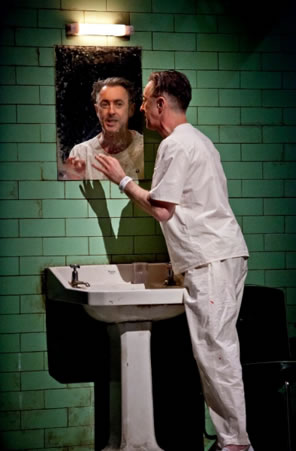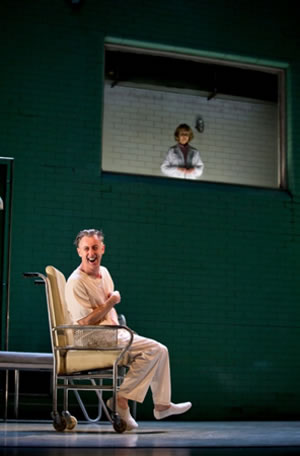Alan Cumming's Macbeth
A Mad Man's Take on a Play of Madness
Alan Cumming/National Theatre of Scotland, Ethel Barrymore Theatre, New York, N.Y.
Saturday, April 13, 2013, D–106&107 (center orchestra)
Directed by John Tiffany and Andrew Goldberg

Alan Cumming, as a psychological ward inmate, plays Macbeth speaking to the murderer (in the mirror) in his production of Macbeth at the Ethel Barrymore Theatre in New York. Below, Cumming's patient is Duncan on his throne as the prison hospital's doctor (Jenny Sterlin) observes. Cumming, playing 15 of the characters in Shakespeare's play, uses Macbeth to portray, reflect, and delve into man's criminal insanity. Photos by Jeremy Daniel, macbethonbroadway.com.
It takes cojones to play the entirety of William Shakespeare's Macbeth pretty much by yourself. It takes double cojones to do it while also playing an inmate in a hopital ward for the criminally insane and nearly drowning yourself on stage night after night. Alan Cumming clearly has more cojones than Macbeth, Macduff, and Lady Macbeth combined, and his unique take on Macbeth, which originated at the National Theatre of Scotland and played as part of the Lincoln Center Festival last summer, has returned to New York to take up hot-ticket residence on Broadway.
Certainly it's great theater. You can sit through Cumming's performance, currently wowing audiences at the Ethel Barrymore Theatre, and be flabbergasted at the sheer audacity of what he accomplishes. It's certainly great art, in creation and performance, as the story of Scotland's infamous regicide and the bloody tyrant who committed it plays out against the backdrop of a man in modern times who committed some heinous deed of his own. It's also great Shakespeare, as Cumming brings interesting perspectives to the play and the players in it.
Cumming has a special affinity for Macbeth; he made his professional acting debut playing Malcolm in Michael Boyd's production at Glasgow's Tron Theatre in 1985. His resume ranges wide over the acting spectrum, and he has impeccable Shakespeare cred with his indelible performance as Saturninus in Julie Taymor's film Titus. He also played Sebastian in her film version of The Tempest. But rather than giving your standard one-person presentation of the play, Cumming plays a patient in a mental ward. The set, designed by Merle Hensel, is a medical ward with green tile walls, metal frame beds, simple institutional chairs, lamps and surveillance cameras sticking out of the walls, a sink, and a bathtub. On one side, metal steps lead to a door with a code box while the back wall has an observation window. You might not notice the three screens above the stage.
 The play opens with Jenny Sterlin as a doctor gathering physical evidence from Cumming and Brendan Titley as an orderly helping Cumming change into hospital garb and placing his belongings in evidence bags. Cumming insists on keeping one of the three bags. He sits on a bed, a man lost in "what happened?" and as the doctor and orderly are about to leave, he turns to them and speaks the play's first line: "When shall we three meet again?"
The play opens with Jenny Sterlin as a doctor gathering physical evidence from Cumming and Brendan Titley as an orderly helping Cumming change into hospital garb and placing his belongings in evidence bags. Cumming insists on keeping one of the three bags. He sits on a bed, a man lost in "what happened?" and as the doctor and orderly are about to leave, he turns to them and speaks the play's first line: "When shall we three meet again?"
"In thunder, lightning, or in rain? When the hurly-burly's done, when the battle's lost and won." This opening passage spoken by the Weird Sisters could be taken as a state of nature, the nature of man, or the storm inside one man's mind. That last is how Macbeth plays out as Cumming works through the play. Along the way, hints of his character's crime emerge. There is paranoia: the witches become himself captured by the security cameras and played, from their three angles, on the screens above. The Macbeths' bloody hands correspond with Cumming cutting himself, requiring intervention from the doctor and orderly. The murderer is Cumming's reflection in the mirror above the sink. Banquo's ghost is a man in a red leather mask haunting his sleep (on the screen above, the man removes the mask and it is Cumming). The apparitions become the entrails of a crow Cumming captures in a vent and disembowels. In the most chilling moment, when Macbeth invades Macduff's castle, killing Lady Macduff and the children, Cumming removes a child's sweater from his evidence bag and submerges it in the bathtub. And when Macduff overcomes Macbeth, Cumming himself submerges in the bathtub; we can see him on the screens, and what seems to be at least two minutes pass before he comes up gasping for breath. Again, the doctor and orderly intervene. They get the crying Cumming to his bed, get him settled, and start to leave. "When shall we three meet again?" he calls out to them. Round, around, around, about.
By my count, Cumming plays 15 of the play's 29 characters (the doctor and orderly play the doctor and waiting-gentlewoman, respectively, who watch Lady Macbeth/Cumming sleepwalking from the observation window above). Change of voice, posture, and various habits distinguish the characters. Banquo is ever playing with an apple, Macduff is a virile, humorless man even before the massacre at his castle, Malcolm is a doll Cumming finds in the ward, the Weird Sisters are truly weird. All the key scenes of the play are here. The only notable scene missing is the Porter's, and, frankly, its absence is the only demerit I give this production—the knocking on the door and Cumming as Porter were something to anticipate, and as he skipped over that scene it left me wanting.
Cumming's Macbeth is something paranoid even upon meeting the Weird Sisters in the first act, and he is very willing to accept the veracity of things supernatural. As such, a madness seems to be lurking in this Macbeth all along, and the Weird Sisters merely unshackle it. He does resist the voices he hears at first (for certain, Banquo hears them, too, but doesn't allow them to consume him), but eventually Macbeth opens the door into the darkest recesses of his mind and unleashes havoc.
Lady Macbeth is Cumming's greatest revelation. She reads the letter from her lord while taking a bath, and even in this solitude she's flirtatious. The "unsex me here" speech is, ironically, filled with sexual passion, and when the Macbeths discuss the murder, they do so while making love. "Screw your courage to the sticking place," she says, and applies her metaphor literally.
To call Cumming's show a tour de force performance is really an understatement. He has crafted a play of a play that moves on three levels: the actor playing a man trying to come to grips with his insanity performing a play that delves into mankind's insanity. That there are no answers here or there, now or then, is disturbing. That Cumming takes this double-edged journey is cathartic. That he puts his figurative cojones on stage for us is a gift of his gifts.
Eric Minton
April 18, 2013
Comment: e-mail editorial@shakespeareances.com
Start a discussion in the Bardroom



 Find additional Shakespeareances
Find additional Shakespeareances